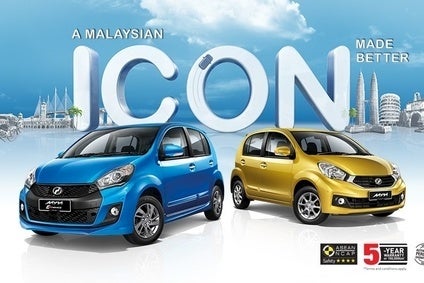
Malaysian nation carmaker Proton has been in decline as protectionist trade measures in Malaysia have been eroded under regional trade agreements. However, Malaysia number two maker – Perodua – has fared relatively well recently. Tony Pugliese examines the picture.
Malaysia’s second national car company, Perusahaan Otomobil Kedua Sendirian Berhad – better known as Perodua Sdn Bhd, continued to cement its position as the country’s dominant vehicle brand in the first part of this year. The company was founded in 1993 with Japan’s Daihatsu Motor as its strategic partner, initially to share in the success of the country’s first national car company, Perusahaan Otomobil Nasional Sendirian Berhad – or Proton Holdings bhd, which at the time dominated this highly protected domestic market.

Discover B2B Marketing That Performs
Combine business intelligence and editorial excellence to reach engaged professionals across 36 leading media platforms.
The ultimate aim of both companies was to maximize the employment and technological development opportunities offered the country’s expanding vehicle market. With little alternative to Proton’s heavily incentivised cars of questionable quality, Perodua was established also to provide crucial competition, raise quality standards and bring more choice to the Malaysian consumer.
When Perodua was first established, Proton controlled close to 60% of the Malaysian vehicle market, including passenger vehicles and commercial vehicles. What has happened since then is a massive reversal of fortunes.
In the last 20 years, the Malaysian vehicle market has more than tripled in size, from 192,000 units in 1995 to 666,500 units in 2014. Proton’s domestic sales have declined during this period, from 132,000 units in 1995 to 115,800 units last year – equivalent to 17% of total vehicle sales. The company also exports fewer cars than it did 20 years ago.
Perodua overtook Proton as the country’s dominant car brand some ten years ago and last year its domestic sales amounted to 195,600 units, for a market share of almost 30%.
In the first four months of 2015 Perodua domestic sales jumped by over 21% to 74,700 units, to claim a 35% market share. This was more than double Proton’s 32,700 sales and 15.3% market share during the same period.
The Malaysian government is struggling with the dilemma of whether to continue to protect its national car companies, especially now that they are privately-owned. The alternative is to create a level playing field for all vehicle manufacturers, to the benefit of the Malaysian consumer.
While Proton seems to be in freefall, the overall share of national car companies in Malaysia has changed little over the years. Perodua has been the main company to benefit from Proton’s losses. Although Perodua has made strong gains primarily because its offers more attractive and better quality products than Proton, it also benefits from tax advantages not available to non-national brands. Therefore, it is able to price its cars at a huge discount to similar products from Toyota and Honda, for example.
Perodua recently confirmed plans to enter the compact/sub-compact 4-door saloon market, presumably in the next two years. This does not augur well for Proton, which depends heavily on this segment.
Perodua is mostly-owned by local private companies, including UMW Corporation with a 38% stake. Japan’s Daihatsu Motor controls 25% of its equity and a further 7% is controlled by Mitsui Corporation. Daihatsu is responsible for supplying all products and technology.
Thus, Perodua essentially is operated as an overseas subsidiary. Daihatsu is increasingly prepared to give its Malaysian partner a greater role in supplying other markets in the region – thus becoming increasingly important part of Daihatsu’s regional supply network. At the same time, Proton is struggling to find a viable growth strategy, even under the control of local private local conglomerate DRB-Hicom, and is urgently in need of a strategic partner of its own.
The key question for Malaysia remains: Is a national car policy still relevant in a rapidly globalising world? Perodua’s recent success has been helped by Proton’s weaknesses. It also reflects some continuing national car policy benefits in the context of its favourable position – for now – as an important regional volume source for technology partner Daihatsu. However, Proton’s decline perhaps serves as a warning of the long-term dangers of too much reliance on special protection in the domestic market.




